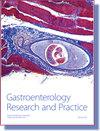癌症大肠癌血小板糖杯状蛋白与高微卫星不稳定性的关系
IF 2
4区 医学
Q3 GASTROENTEROLOGY & HEPATOLOGY
引用次数: 0
摘要
背景:血小板体积升高是结直肠癌(CRC)患者发展和总生存期差的危险因素。微卫星状态和血小板糖蛋白Ibα (GPIbα)与结直肠癌患者血小板体积相关。本研究旨在探讨结直肠癌患者血小板GPIbα外结构域(称为glycalicin)水平及其与结直肠癌微卫星状态的关系。方法收集2018年1月至2018年12月哈尔滨医科大学肿瘤医院收治的430例结直肠癌患者的临床和实验室资料。用聚合酶链反应测定微卫星状态。根据微卫星状态将参与者分为微卫星高不稳定组(MSI-H)和微卫星稳定组(MSS)。用酶联免疫吸附法测定糖钙素水平,用受体工作特征曲线确定截断点。通过电子病历收集患者的临床和病理特征。采用Logistic回归方法探讨糖钙素与微卫星状态的关系。结果入选的430例结直肠癌患者中,64例(14.9%)为MSI-H型结直肠癌,其余为MSS型结直肠癌。与MSS患者相比,MSI-H患者的糖钙素水平显著降低。在控制了潜在的混杂因素后,逻辑回归分析显示糖钙素水平与MSI-H CRC独立相关。结论糖钙素水平降低与MSI-H型结直肠癌相关。糖钙素与MSI-H在结直肠癌患者中的关联机制有待进一步研究。本文章由计算机程序翻译,如有差异,请以英文原文为准。
The Association between Platelet Glycocalicin and High Microsatellite Instability in Colorectal Cancer
Background Elevated platelet volume is the risk factor for the development and poor overall survival of colorectal cancer (CRC) patients. Both microsatellite status and platelet glycoprotein Ibα (GPIbα) are related to platelet volume in CRC patients. This study aimed to investigate platelet GPIbα ectodomain (termed glycocalicin) levels among CRC patients and the association between the glycocalicin levels and microsatellite status in CRC. Methods The clinical and laboratory data of 430 CRC patients between January 2018 and December 2018 in Harbin Medical University Cancer Hospital were collected. The microsatellite status was determined with a polymerase chain reaction. The participants were separated into high microsatellite instability (MSI-H) and microsatellite stable (MSS) groups according to microsatellite status. The glycocalicin levels were measured with an enzyme-linked immunosorbent assay, and the cut-off point was determined with the receiver-operating characteristics curve. The clinical and pathological characteristics were collected via electronic medical records. Logistic regression was used to explore the association between glycocalicin and microsatellite status. Results Among the 430 CRC patients enrolled, 64 patients (14.9%) were identified as MSI-H and others as MSS CRC. Glycocalicin levels were significantly reduced in patients with MSI-H than those with MSS. After controlling for potential confounders, logistic regression analysis revealed that glycocalicin levels were independently associated with MSI-H CRC. Conclusions Reduced glycocalicin levels are associated with the MSI-H subtype of CRC. Further research is needed to elucidate the mechanisms of the association between glycocalicin and MSI-H in CRC patients.
求助全文
通过发布文献求助,成功后即可免费获取论文全文。
去求助
来源期刊

Gastroenterology Research and Practice
GASTROENTEROLOGY & HEPATOLOGY-
CiteScore
4.40
自引率
0.00%
发文量
91
审稿时长
1 months
期刊介绍:
Gastroenterology Research and Practice is a peer-reviewed, Open Access journal which publishes original research articles, review articles and clinical studies based on all areas of gastroenterology, hepatology, pancreas and biliary, and related cancers. The journal welcomes submissions on the physiology, pathophysiology, etiology, diagnosis and therapy of gastrointestinal diseases. The aim of the journal is to provide cutting edge research related to the field of gastroenterology, as well as digestive diseases and disorders.
Topics of interest include:
Management of pancreatic diseases
Third space endoscopy
Endoscopic resection
Therapeutic endoscopy
Therapeutic endosonography.
 求助内容:
求助内容: 应助结果提醒方式:
应助结果提醒方式:


